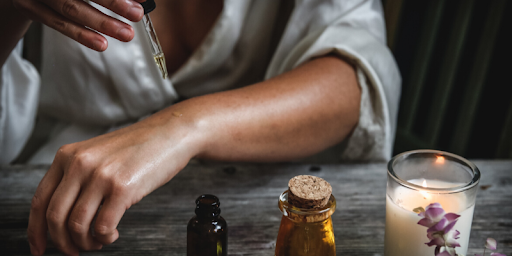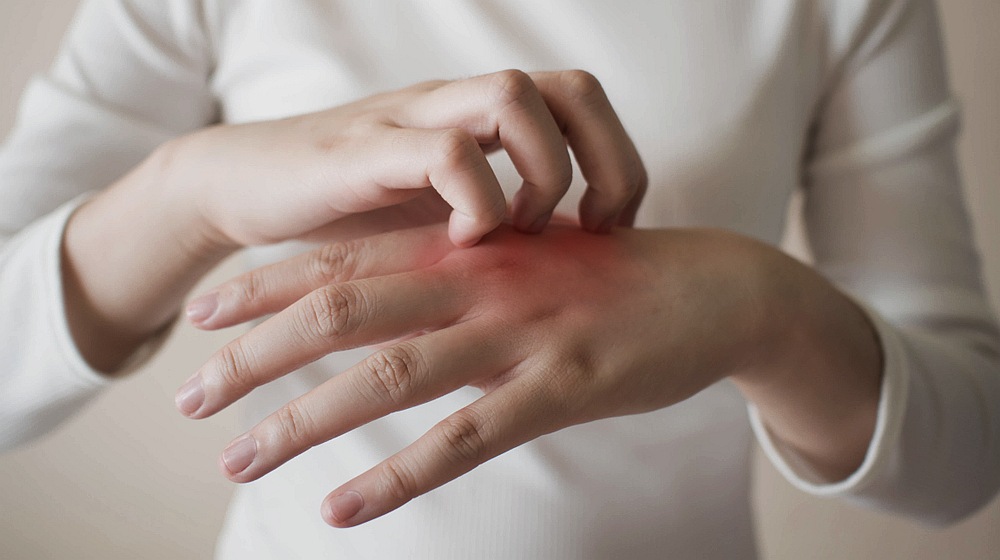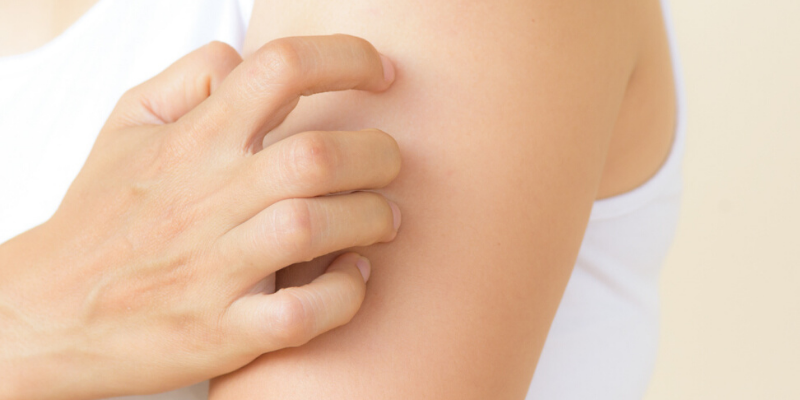


There are few conditions as common but unrelenting as eczema. It is estimated that 35 million people in the United States alone suffer from this skin ailment. Whether you have experience handling this skin problem, or if you’re new to dealing with your eczema, know that you’re not alone. While eczema is not uncommon, it is also not well understood by scientists and those afflicted with it. While more and more research is done on causes and cures, we can use what we DO know to help manage it.
Eczema is frustrating as it is uncomfortable, and can ruin the appearance of skin. It also has a tendency to return again and again, which can be very discouraging and take a toll on day-to-day life and even confidence. If you are looking for ways to manage your eczema and get back to focusing on what matters, it’s time to take stock of what you do know, and look at ways of treating it that may be effective for you.
Types of Eczema
First, we should clear up a common confusion. Eczema is not just one skin condition, but refers to a group of skin conditions characterized by a lack of moisture and a rash. There are many types, and knowing what kind you have is helpful in treating it as triggers and symptoms vary.
So what do you actually mean when you say you have eczema? The following are the most common forms:
- Atopic Dermatitis is the most common type of eczema. It usually starts in childhood and is accompanied by asthma and hay fever. Have you ever wondered what triggers skin problems? Various factors such as dry skin, environmental triggers, or immune system issues can cause it. It’s always important to take care of your skin and be mindful of the triggers that can affect it. It usually appears on the elbows and knees.
- Contact dermatitis occurs when skin reacts to something it comes into contact with.
- Dyshidrotic eczema causes blisters to form on the hands and feet. Some believe that contact with metals like nickel may cause it.
- Nummular dermatitis is a skin condition that is more difficult to treat compared to other types of eczema. Its appearance is also distinct from the typical eczema rash. The most common symptoms of nummular dermatitis include dry skin with round, raised spots, itchy skin, and open sores. This condition can occur due to insect bites or dry air.
- Seborrheic dermatitis is a specific type of eczema that commonly occurs on the scalp, although it may also develop in other parts of the body that are prone to becoming oily, such as the face, chest, and back. Unlike other types of eczema, seborrheic dermatitis is not caused by an allergy, but by a lack of moisture in the affected area. The most common symptoms of seborrheic dermatitis include redness, crusty flakes, and greasy skin.
- Stasis dermatitis is a skin condition that occurs due to poor blood circulation. This results in the leakage of fluid, which causes swelling and itching..
Recognizing what kind of eczema you have is important for treating it. By recognizing symptoms, you may start to see what triggers eczema outbreaks as well. As you learn your triggers, you may be able to prevent future outbreaks. It is also common that people suffer multiple types of eczema over the course of their life. If you are struggling to determine what form of eczema you have, it will probably be in your best interest to have a dermatologist diagnose it for you.
Causes and Connections: Eczema and the Immune System
The cause of eczema is still unknown, but research suggests an overactive immune system.
When functioning correctly, it is the job of the immune system to recognize foreign substances in the body and neutralize them if harmful. Unfortunately, the immune system can get it wrong sometimes and not react, or in the case of eczema, overreact. Usually, this also means that there is some kind of auto-immune disorder or allergies at play as well. In fact, as more cases of autoimmune disorders are diagnosed, the connection to eczema is seen more and more clearly. Furthermore, researchers have found that people with an immune system “skewed toward allergies” experience a change in the fats in their skin, leaving the skin itself prone to cracking and inflammation, further compounding the issue. Whatever the underlying case may be, this holds true for eczema, as what should be harmless (soaps, fragrances, fabrics, foods) causes the immune system to flip the switch and cause an outbreak of eczema.
The good news is that better understanding the connection between your immune system and eczema can help treat it and prevent further flare-ups. It is possible that by managing your immune system, you can better manage your eczema as well. While some people may need to resort to immunosuppressants or steroids to initially get their eczema under control, a healthy anti-inflammatory diet and probiotic supplements may be enough to keep inflammation at bay.
What Causes Eczema to Flare Up?

If you have experienced eczema flare-ups, you may still need to figure out your triggers. When looking for what triggers an eczema attack there is no easy answer, as they usually vary from person to person. Since the exact cause of eczema is still unknown, why certain things act as triggers for one person but not another is unknown as well.
It is also worth noting that sometimes the eczema rash does not appear right away, making it even more difficult to identify the exact trigger.
However, there are a few common categories that many people find to trigger their eczema.
- When your skin is dry, it can become more easily irritated, which may cause an eczema flare-up.When your skin is dry, it can become more easily irritated, which may cause an eczema flare-up.
- Since eczema is linked to an overactive immune response, it is not surprising that everyday substances can irritate the skin and body for some people. This could be anything, from certain textiles or metals, or fragrances found in perfumes or soaps. For many people, harsh chemicals, such as those found in cleaning products, can cause eczema to flare up.
- The impact of stress on eczema is often noticed, but not well comprehended. Mental stress seems to send the body into overdrive, causing an eczema flare-up.
- Allergens: for people with allergies, everyday allergens such as pollen or dust may trigger eczema. This may be aided by taking an antihistamine.
The Effect of Climate on Eczema
People with eczema know that winter can wreak havoc on their skin. Eczema is a skin condition that makes it difficult for the skin to retain moisture. It usually flares up during the winter months due to the drying effect of cold temperatures outside and hot indoor heating systems. This dry skin may then lead to a dry, scaly rash which if left untreated can crack and become susceptible to infection.
During the winter, moisture will make or break the skin. This means moisturizing multiple times per day, especially after washing hands and showering.
While it’s easy to remember to drink water in the heat of summer, it is almost more important to stay hydrated in the winter. Keeping your body hydrated will keep your skin hydrated. You may also consider using a humidifier, especially while you sleep.
Avoiding certain fragrances, materials, and irritants are other ways that you can avoid eczema flare-ups during the winter.
Managing the Most Common Symptoms
When eczema flares up, skin is very dry and often develops a rash. The type of rash will depend on the type of eczema you have, but it is usually red, swollen, and itchy. Because skin becomes so dry, it is not uncommon for it to crack, leaving it susceptible to painful infections.
When eczema strikes, the most important thing you can do is restore moisture. Luckily there are soothing solutions for extreme dryness, whether it is your hands or face.
First, make sure you’re taking steps to retain the moisture you already have in your skin. Avoid overwashing, be it in the sink or shower, and use a mild cleanser. Soap, while effective for removing bacteria, unfortunately also dries out the skin, so look for cleansers that are high in oil and low in water content. And while we’re on the subject of bathing, skip the hot water. While hot water feels good initially, it is a no-go for dry skin. Heat dries out skin, and for eczema, that only exacerbates symptoms. We want to add as much moisture as possible, not deplete it.
There are many ways of adding and locking in moisture, including some DIY methods with items you may have around the house. Oils such as coconut, avocado, and safflower, are mild and full of fatty acids that nourish the skin. Honey and aloe vera, both available at grocery stores, contain moisturizing and antimicrobial properties when applied topically to the skin. This means they can help restore moisture and stave off infection.
The best moisturizer is one that you can set and forget. It should be thick, full of vitamins, and free from harsh chemicals and fragrances that trigger eczema flare-ups. Pururia’s Mother of All Creams is a popular choice because it is enriched with vitamins E, A, and C. It can be applied to both the face and body, and it doesn’t cause acne breakouts.Crafted from a blend of amaranth oil, avocado oil, shea butter, and aloe, it is ideal for people with sensitive skin. Keeping your skin moisturized and strong will help it stay strong against the threat of eczema!
Soothing Eczema on the Scalp
Few things are as annoying as an itchy scalp! Scalp eczema is a little different than other eczema because of the presence of hair and because the scalp is more prone to oiliness than other parts of the body. For this reason, we will give scalp eczema a little extra attention.
The most common type of eczema to plague the scalp is seborrheic dermatitis. In addition to infants, cradle cap can also occur in puberty or adulthood.
The most common symptom of scalp eczema is the dreaded dandruff. Dandruff occurs when flakes of dead skin mix with excess oil on the scalp, leaving white flakes clinging to your hair and clothing. This is especially noticeable when you have dark hair or wear dark clothing. Even worse, scratching the itch only spreads the dandruff everywhere!
There are many topical treatments on the market, however these treatments, which include shampoos and creams, typically contain corticosteroids or hydrocortisone. While these ingredients are effective for relieving itchiness, they may thin skin after prolonged usage. It is best to only use such treatments for a few weeks and pair them with natural remedies.
There is an abundance of natural remedies for treating eczema on the scalp that both relieve the itchiness and help return moisture to the skin, preventing flaking. Aloe, tea tree oil, and coconut oil are all natural ways of treating seborrheic eczema. You may also want to try an apple cider vinegar soak which loosens scaly skin and helps reboot your scalp’s natural pH.
The health of your hair depends on how you treat your scalp eczema. Some hair products can cleanse your hair and scalp, but others can disrupt your natural oil balance and cause eczema and dandruff. That’s why you should stay away from harsh, drying ingredients. Puriya’s Scalp Clarifying Shampoo has a special mix of Arnica, Sage, Rosemary, and Tea Tree oils that hydrate and calm your scalp. The oils can also restore your hair’s strength and shine, and you can use them every day. It is perfect for getting rid of the extra oils and dirt on your hair and scalp, and it may help you avoid dandruff. Use a pH balanced Conditioner after the shampoo to moisturize your scalp and hair. Puriya’s Scalp Clarifying Conditioner is also free of sulfates and other harsh chemicals, and it has Aloe and Vitamin B complex, which are good for your skin and hair.
Prevention: Eating an Eczema Friendly Diet

Many people have found that changing their diet has helped them experience fewer and less miserable eczema flare-ups. As eczema may be due to an inflammatory response caused by an overactive immune system, reducing inflammation in the body is vital. One of the easiest ways to do this is to begin an eczema-friendly diet.
It’s true: the word “diet” is tossed around enough to make anyone wary, especially as a solution to losing weight fast. But diet is about so much more than weight. Including and avoiding certain foods is an effective way of managing inflammation and preventing eczema.
It is important to eat a diet rich in anti-inflammatory foods. This includes fruits and vegetables such as apples, cherries, blueberries, and greens, which are known to reduce inflammation. It also means boosting your intake of healthy fats and food rich in omega 3’s like salmon.
The jury is still out on whether supplements actually do much to combat eczema. However, probiotic and prebiotic supplements have been found effective. Prebiotics can also be added to your diet as they are commonly found in dandelion greens, onions, garlic, leeks, and asparagus.
While some foods prevent inflammation, there are then those that cause it. These foods may act as triggers for your eczema, and should be avoided. Before you cut it all completely, you may want to try an elimination diet to determine which foods are triggers for you, as triggers often vary from person to person. Foods you may need to cut include dairy, eggs, gluten/wheat, nuts, and heavily processed foods. You probably will also need to avoid soy and sugar. These foods may aggravate and add to inflammation. There are also some fruits and vegetables that may cause itchiness, however, this varies from person to person. Check out this blog for a helpful infographic and information on food to avoid, as well as anti-inflammatory recipes!
Treating Eczema with Essential Oils
Looking for ways to treat your eczema naturally? Essential oils have a long history of being used for treating common skin conditions: eczema included. Essential oils are highly concentrated extracts derived from plants. You may already be using them for aromatherapy, or have tried them in various creams and lotions. Many are also used in popular perfumes.
When managing your eczema, the hope is to prevent flare-ups and relieve symptoms. Fortunately, many essential oils have anti-inflammatory properties that may help skin regulate its reactions. Many also have soothing effects, and can be used to soothe itchy skin.
Since essential oils are so concentrated, avoid applying them directly to your skin. This can actually irritate skin even more. Instead, mix them with a carrier oil, or dilute them with water in a bath.
So where should you start? When it comes to eczema, there are many options. Lavender, which is often used in aromatherapy, is popular for soothing eczema symptoms on the scalp. It is also known to soothe anxiety and aid it sleep, making it ideal in aromatherapy. Mix it in a bath to experience both the skin soothing and relaxing benefits of this oil! Eucalyptus is also popular in a bath and has the added benefit of having antimicrobial properties. While this has lent it to being used as an antiseptic, it also means that it can be a key player in relieving eczema, as it may prevent infection in cracked, eczema ridden skin.
Have you heard of copaiba? Derived from a tree resin, copaiba packs a triple punch against eczema as it can reduce inflammation, fight bacteria, and even soothe pain. How about helichrysum? This is another powerful essential oil.
Jojoba, patchouli, rose, and neroli may all be useful additions to your eczema regimen. For over fifteen essential oils and how to use them, check out this blog!
When All Else Fails, Moisture Prevails
Whether your flare-ups are triggered by contact, diet, stress, or weather, moisture will always be the bottom line. No matter the season, you need to be sure you are receiving proper hydration from the inside out by drinking plenty of water, and the outside in by religiously applying a moisturizer.
Ending Irritation and Dryness: Why Puriya
Eczema can be relentless, and at its worst, you may feel like you will never see beautiful, clear skin again. If you feel like you have tried everything in your search for eczema solutions, from medications to home remedies, and nothing has worked, then it is time to fight eczema with the power of Puriya. Puriya’s Mother of All Creams has a non-comedogenic formula which means it does not block pores and so can be used anywhere: face, hands, feet—you name it. Its plant-rich formula takes the best of the best of nutrients known for soothing eczema and combines them into a powerful blend that packs moisture back into your skin while also alleviating symptoms.
If scalp eczema has you scratching your head, don’t forget to check out Puriya’s Scalp Clarifying line of shampoos and conditioners to see a clear scalp and dandruff disappear!
Tags: atopic dermatitis, causes of eczema, dry skin, eczema, eczema treatment


